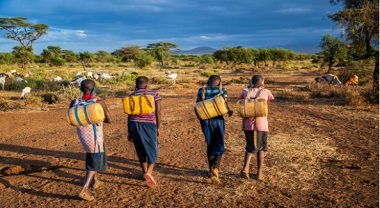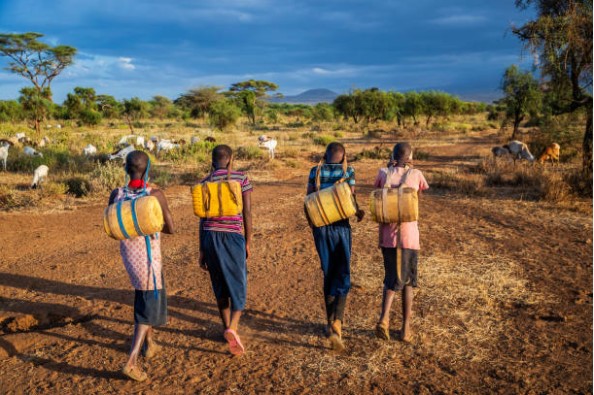Maasai Fashion: Indigenous People Vs Corporates
The Maasai community and their issues
The Maasai are an indigenous tribe found in various parts of Kenya and Tanzania. The Maasai are not only proud warriors but are also skilled artisans. One can identify them by their iconic red-checked printed shukas, beaded necklaces, extravagant jewellery, majestic headgears, exquisite hair styles, and colourful accessories. However, in the modern world the Maasai tradition has been reduced to a mere glamorous fashion trend and money-minting business by leading corporates. Jaguar Land Rover had used the imagery of the Maasai community to enhance the aesthetics of their advertisement. A shoe company called Masai Barefoot Technology as well used Maasai iconography while launching their brand.
Corporate giants like Louis Vuitton, Calvin Klein and Ralph Lauren, on the other hand, blatantly and unfairly used in their clothing collection the exact patterns and designs that are unique to the Maasai community. Long story short, these companies have been earning a fortune behind the veil of aesthetic Maasai fashion.
The Maasai Brand
To no one’s surprise, the value of these products was estimated to be of worth more than USD 10 million per annum. On the contrary it is heart-wrenching to take cognizance of the fact that out of over 2 million Maasai people in East Africa, about 80% are said to live in dire poverty. This is primarily owing to the lack of economic opportunities reserved for them. On top of it, when major companies incorporate Maasai-related elements in their products, the people of this community are not paid their portion of royalties. It is important to note that Maasai elements when used in a product add an intangible value to it. It is observed that often the intangible value exceeds the value of tangible components of the article. Hence, it is unethical to use Maasai imagery for the sake of free advertisements or cultural misappropriation. In other words, the Maasai elements have now become synonymous to a brand commonly known as “Maasai Brand” and technically the use of these components adds more to the brand value of the product. This is the reason why the community is absolutely justified in demanding a decent amount of royalty when their name or image is used as a part of corporate projects.
Protection of community’s IPR
Article 31 (1) of the United Nations Declaration on the Rights of Indigenous People confers several rights upon the indigenous people in terms of intellectual property which also includes protecting their Traditional Knowledge (TK), Cultural Expressions, medicine, and other practises. Furthermore, Article 31 (2) directs the states to protect and preserve the IPR of indigenous groups. It is however pertinent to take note of the fact that apart from international law, it is important for the nation states to intervene and enforce intellectual property related laws and especially address those issues that are local to the region.
The Protection of Traditional Knowledge and Cultural Expressions Act (PTKCEA), 2016 passed by the Kenyan government elaborated categorically upon the IP rights of traditional communities. Sections 21 to 24 under Part IV of the PTKCEA makes the right of attribution of ownership with regards to their TK and cultural expressions, an enforceable moral right. Section 21(2) (c) of the Act confers the right not to have TK and cultural expressions subject to derogatory treatment. The said legislation does protect and promise remedies to the Maasai on national level. However, a support group called Maasai IP Initiative Trust Ltd (MIPI) in collaboration with Light Years IP has proved to be a more effective platform to voice the concerns of the Maasai people. MIPI has not only been recovering back trademarks from various global corporates but is also imparting IP education to the Maasai tribe with an aim to respect and assist the community with sustainable revenue.
Meg Brindle and Natalia Florman suggest that the first step towards protecting Maasai IP would be to make sure that the products are researched & assessed before launch and in case they have Maasai iconography then the tribe should be paid in proportion to the brand value attached, after prior consultation with the representatives. They advocate for fair trade practises and have proposed to introduce Maasai stamps that authenticate the same. These would be stamped only on those products that give due credits as well as royalty to the tribe and would aim to achieve a healthy co-existence of all the stake-holders involved.
Parting Thoughts
The battle was never between corporates and tribes in the first place. Neither are the Maasai against the idea of providing an international platform to their designs and culture. The war is predominantly against the practise of plagiarizing Maasai Cultural Expressions & using their imagery in order to make enormous profits without appropriately compensating the Maasai for the brand value brought in. On one hand, where these gigantic companies are monetizing the Maasai culture in the worth of billions of dollars the real owners of its IP are struggling for a two-square meal. This disparity must end. IP enthusiasts and legal professionals should come up with alternatives to initiate discussions between the companies and Maasai tribe. Such platforms would give the tribe more power to negotiate and earn sustainable revenue.
Intellectual Property Rights are human rights and human rights are conferred upon everyone irrespective of their socio-economic bracket. It is the need of the hour to get ourselves educated with regards to IP rights of ethnic groups. Indigenous people still lack the level of digital presence that many other communities have, which often means their voices go unheard; they deserve to live a life as dignified as anyone else. The corporate and legal world must make sure to not be so ignorant about Indigenous rights so as to help lessen their legal battles for enforcing their Intellectual Property Rights across the world, which for communities as impoverished as the Maasai, are no less than their human rights.
Author: Fatima Ali – a student of NMIMS Kirit P. Mehta School of Law (Mumbai), in case of any queries please write back us via email at support@ipandlegalfilings.com or contact us at IP And Legal Filings.




